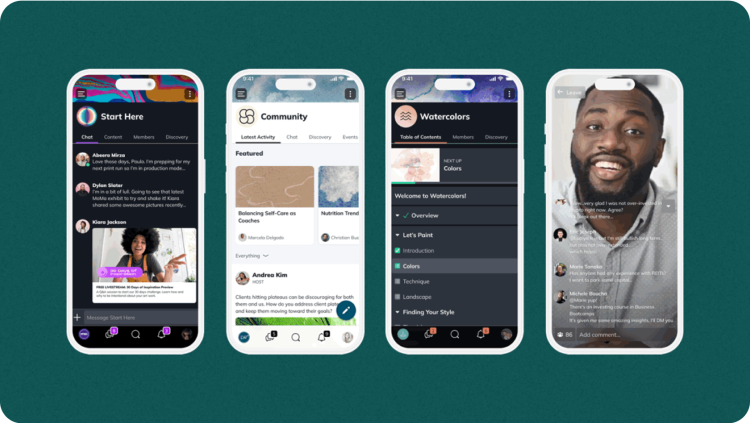Online Courses
Kajabi vs. Teachable
If you're wondering where to host your online courses, here's how these popular platforms compare.
Author
Mighty Team
Last Updated
May 27, 2025

If you’ve considered creating an online course, then you’ve probably heard of Kajabi and Teachable.
These two platforms are some of the most popular out there for creators looking to offer an online course.
Both Kajabi and Teachable are online course platforms. But they have very different strengths and specialties -- and when you break down the features the comparison is actually pretty simple.
In this article, we'll compare Kajabi vs Teachable to help you figure out which is right for your course business. We'll walk through:
What an online course platform is
What Teachable and Kajabi have in common
Main ranking features to consider
How Kajabi vs Teachable compares for features, engagement tools, monetization, native app experience, and customer service
If you want more support in building your online course and community, come join OUR Mighty Community for free and meet other new and established community owners! We’d love to meet you. Join for free!
What is an online course platform?
An online course platform brings together e-learning authoring with a learning management system so that instructors can create and sell digital courses. Modern online course creation platforms usually let you build and host e-learning, but they also often manage things like sales and marketing, while also letting you add your own branding.
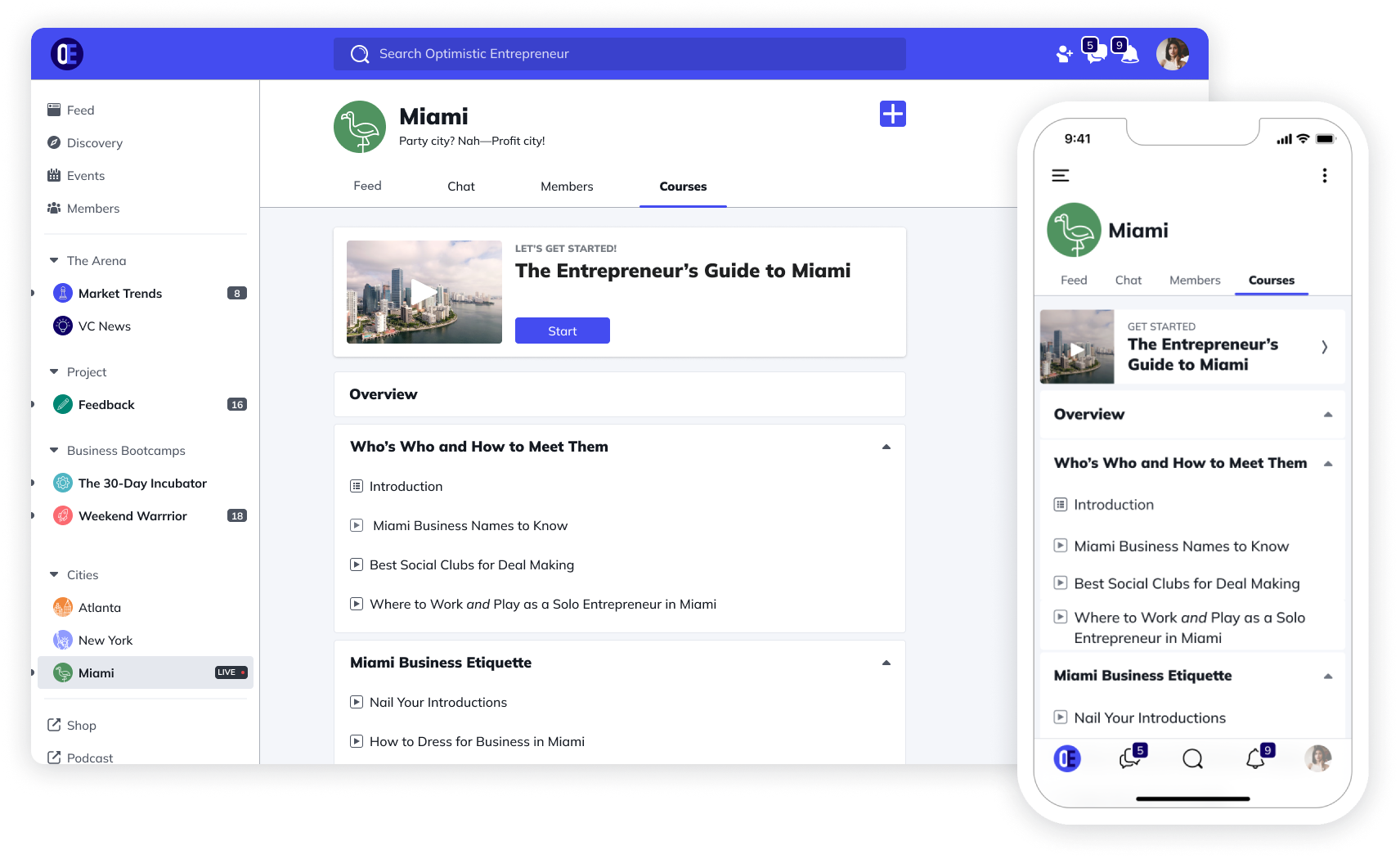
The best platforms have engagement features too, letting you connect with your students with things like events, livestreaming, forums, chat & messaging, email, etc.
Kajabi vs Teachable: Who are they?
Kajabi is an online course platform with a full suite of course-building tools for pre-recorded courses, that also heavily emphasizes the marketing and sales of online courses.
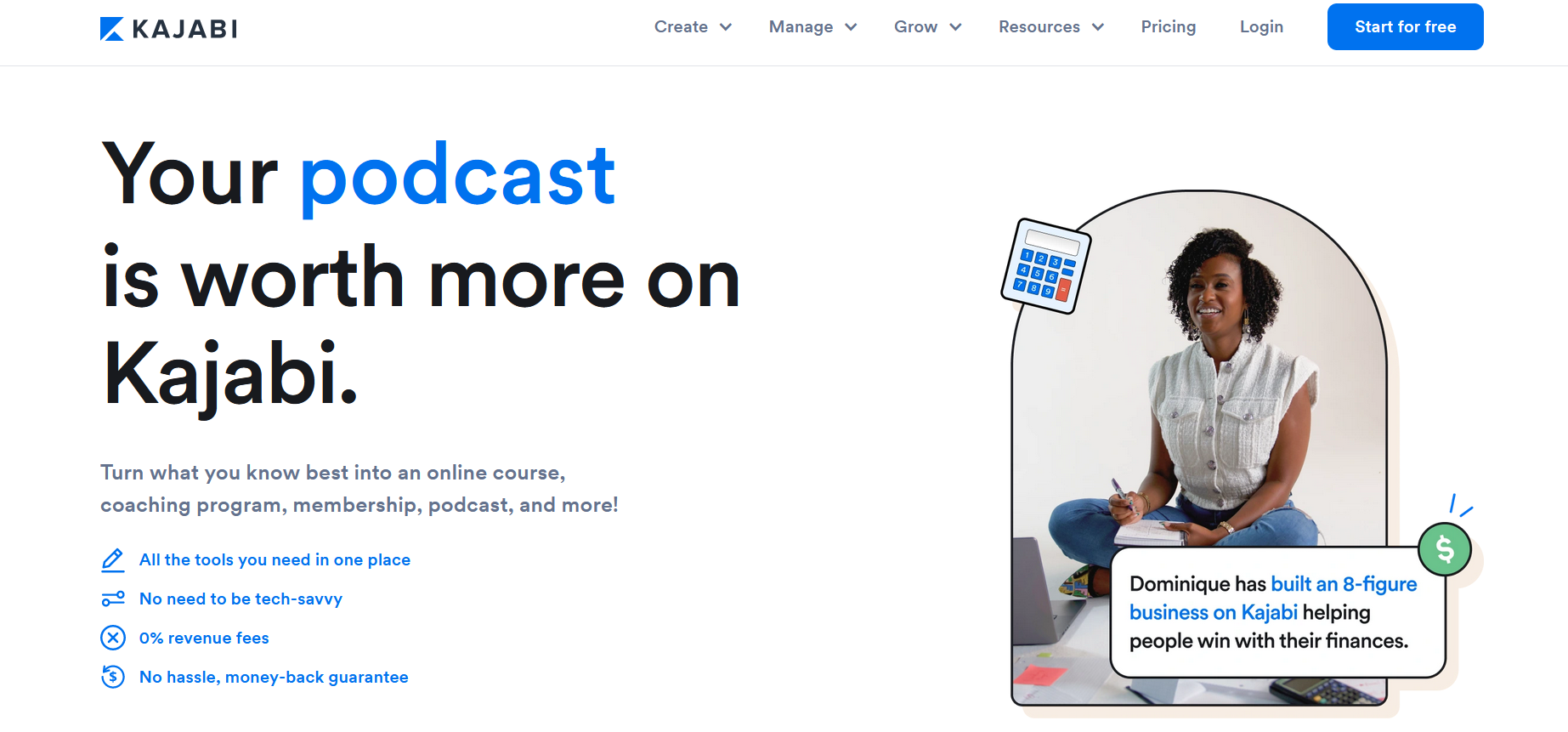
They believe that creators should not only be able to deliver high-quality online courses, but they should be given the tools to sell too. This translates into Kajabi focusing a lot of resources into their email, landing page, and sales features that creators can use to get more eyes on their work and convert more. They've also recently added some engagement features, which we'll get into below.
Teachable differentiates itself from Kajabi by focusing on customization and a streamlined approach to online course design. They’ve grown in popularity because of the tools they’ve developed like their “power editor” which allows creators to build multimedia content.
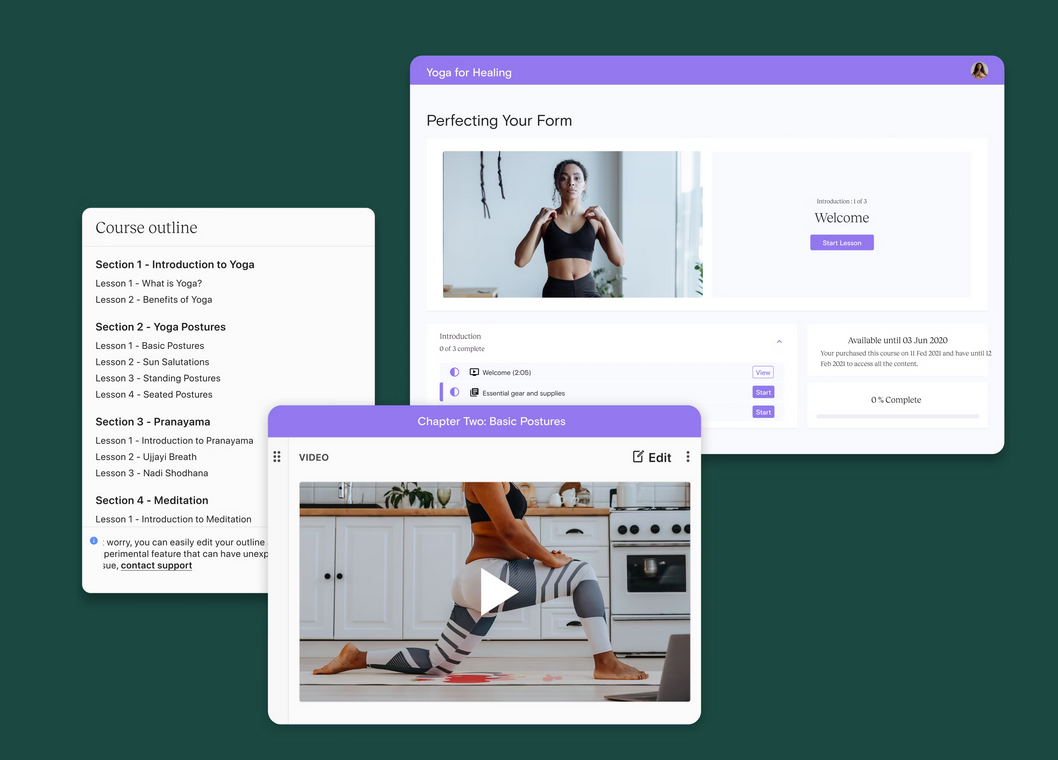
The typical content that Teachable creators focus on are things like lectures, webinars, coaching packages, digital downloads, and surveys that members can interact with.
What Kajabi and Teachable have in common
There are a few features that both Teachable and Kajabi share with each other, and with many other course builders. These are as follows.
Both Teachable and Kajabi offer good content options that let you build and host courses: videos, audio, text, etc. Each has ways to assess students and offer certificates for completed courses.
Both platforms have integrated "website builders" that let you build hosted landing pages for a course (including templates), and some customization of how your course looks and feels.
Both platforms were created with synchronous-first course engines. This means that Teachable and Kajabi both perform best for pre-recorded courses. While both are trying to expand into other styles of learning, the UX is really clearly focused on delivering packaged content -- and it shows when you use them.
Both have different options for monetization though, most notable for creating memberships that lead to a recurring revenue businesses - we'll break these down below.
Both offer calendar integrations for running coaching programs.
Both platforms do have good options for marketing and selling courses: sales features, up- and down- sells, discounts, multi-currency checkout, and the option to build an affiliate marketing program.
Both platforms have analytics and reporting to assess course success.
Both platforms have code-editing for more advanced course styles or customized by developers (not relevant for most independent creators).
Kajabi vs Teachable: Judgment criteria
Having some clear-cut criteria for assessing an online course platform will help you figure out which one is right for you.
Features. We talked above about the different course features of each--and they have a lot in common. So this likely won't be the deciding factor for you, but we'll break it down a bit more.
Engagement tools: Engagement in courses is vital, and more and more course platforms are including awesome engagement features that are dedicated to building connections with and between members. Features like live and recorded video, polls, Q&As, discussion boards, direct messaging, and subgroups are all great to have. But also, it's becoming more and more common to teach live courses (AKA cohort courses), so we'll rank each of these on their community and live instruction features.
Branding & Customization: Your course can reflect your own brand. We'll rank Teachable vs Kajabi on which gives you more branding power to create a course that looks and feels how you want it to.
Monetization. Choosing between Kajabi vs Teachable requires more than just the ability to teach a course. If you're building an online course business, you need the features to actually run that business. We'll compare which platform gives you more.
Native mobile app experience. We are in a moment where having your content accessible across web and mobile is incredibly important. Your members should be able to access your online course no matter where they are, and picking a platform with a mobile app should be a top priority. Why? Because when your online course is easy to access, your members will not only be more active, but they will stick around.
Customer service. Which platform is actually going to help you get the answers you need if you're in a pinch?
Kajabi vs Teachable: Comparison
Features
Having a flexible set of features to create the content for your online course still matters. Even though there are a lot of course platforms out there, the UX can play a big role in how members experience your courses.
Kajabi
Kajabi started with pre-recorded courses, but has expanded to offer a few different types of products:
Online course (still strongest features for asynchronous courses)
Coaching tools like scheduling and program-building
Memberships that offer an ongoing payment structure (e.g. for mastermind groups or group coaching).
Communities
Features for monetizing a podcast
All these could be useful things and are signs that Kajabi is thinking holistically about building digital businesses.
BUT, for all the buzz Kajabi tries to create around different businesses, many of these are basically just the same features repeated.
For example, the coaching program is really just a course with dripped content. The membership option is basically a way to gate content with a paywall for repeating payments.
At its core, Kajabi is still best as a pre-recorded course platform.
In terms of online course design, creators can upload videos, assessments, discussion posts, and more.
It's possible to drip content on a predetermined schedule (as per the "Coaching" option).
Features Kajabi is missing:
There's no native livestreaming in the course platform--although you can do it in the community (below). The overall design is clunky for cohort courses.
Kajabi does have student limitations per plan (1,000, 10,000, and 20,000)
Kajabi is missing a proper integration between community and courses (more below)
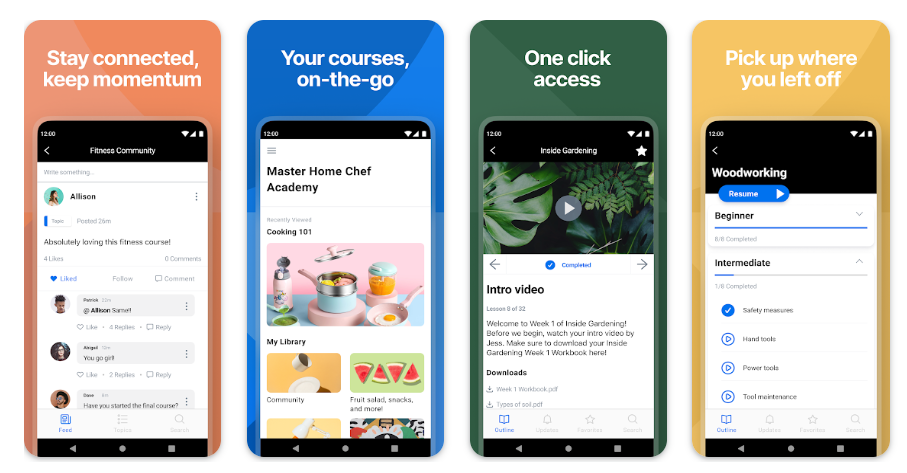
Teachable
Teachable offers a fairly diverse range of features and customization options to its creators. When you build your online course, you will have access to powerful editing software for video lectures and live coaching. On top of that, you also get solid quizzing options and a plethora of other third-party integrations.
Like Kajabi, Teachable has arranged its platform into different ways to offer products:
online courses
coaching (dripping content)
digital downloads
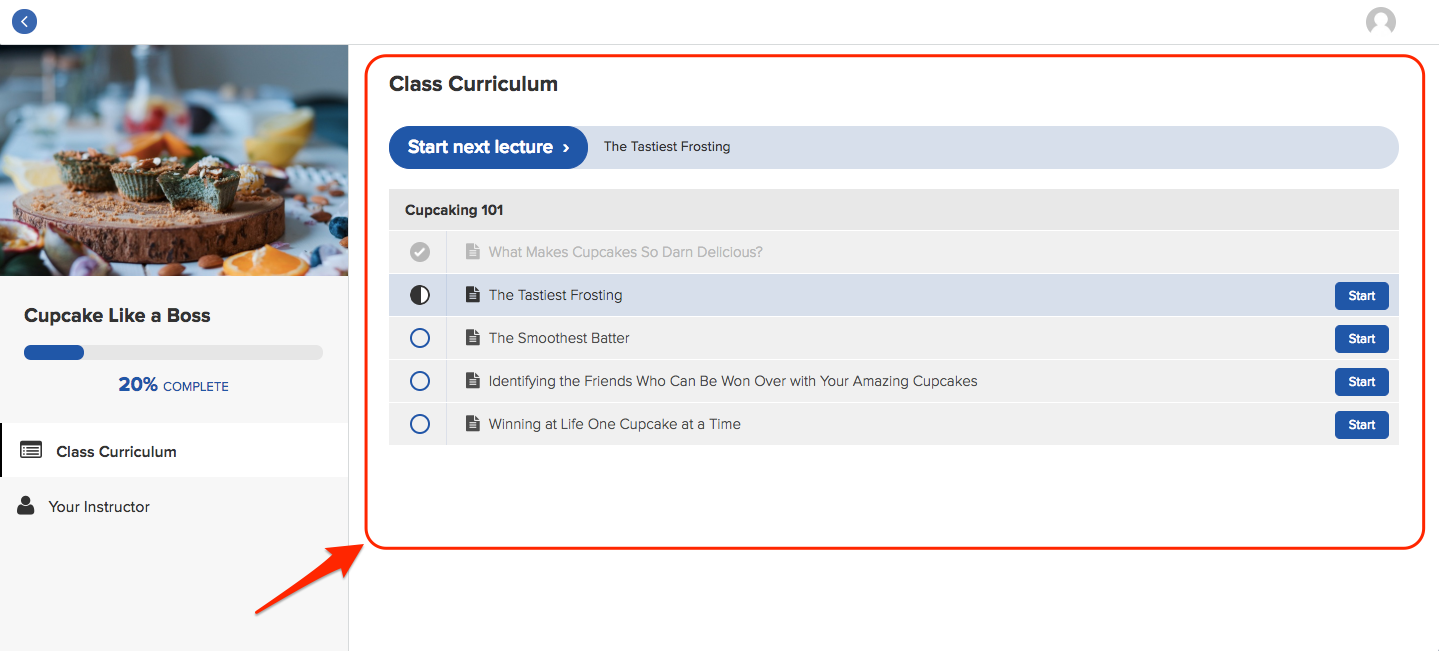
Again, as with Kajabi, these are primarily the course features of any course platform: dripping content, hosting files for download, and a course LMS. Most users wouldn't notice a difference.
Features Teachable is missing
Teachable has NO NATIVE LIVESTREAMING at all.
The engagement features are limited (more below)
The verdict
Both platforms are comparable by features--neither really has the edge on actually teaching courses. The products you can offer with each are also nearly identical: coaching packages, digital downloads, and memberships.
Engagement tools
There's an evolution happening in online course platforms. It's important to understand it to properly assess what Kajabi and Teachable offer.
The word is ENGAGEMENT. More and more course platforms emphasize different ways to engage your students with communities, events, forums, chat and messaging, and live courses.
These engagement tools are the things that make an LMS work. And by comparing these, you'll probably see why both of these platforms could be considered "legacy course platforms."
Kajabi
For a long time, Kajabi had very few engagement features, except for a basic forum platform for simple discussions. But they recently acquired the company Vibely to fill in the need to add online community features for its courses.
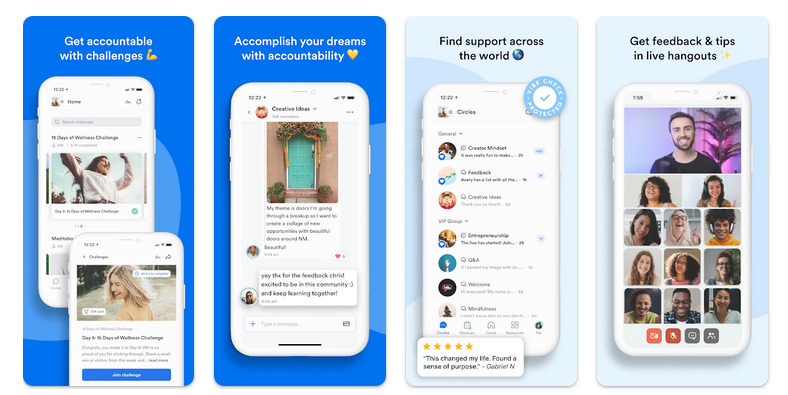
The result has been new engagement features for Kajabi courses. These include:
Live events and rooms for meetings and conversations with RSVPs.
Newsfeeds, chats, and DMs between members.
Challenges and progress tracking.
Kajabi 2.0 gives Kajabi a lot more community features. It's a big improvement on the old Kajabi.
But because it was added through acquisition, the UX is sort of clunky. Students require a separate logon to Kajabi courses and Kajabi community. Because it functions like two different products, the integration between courses and community isn't smooth.
Teachable
When we judge by engagement features, you can really see where Teachable just hasn't progressed as a modern course platform.
Teachable has made very little attempt to add any community or event features. The irony is that Teachable often hosts its own events and virtual summits and community for its creators, but doesn't give creators the tools to do the same for their members.
In fact, several Teachable founders split and created a separate company to add a community option that could compliment Teachable - Circle. The result is a decent community platform, but using both means you're paying for two platforms (and again two logons) -- when Kajabi (and other course platforms) has the same features in one.
And when it comes to messaging your members, you have one option: the integrated email tool. That's it.
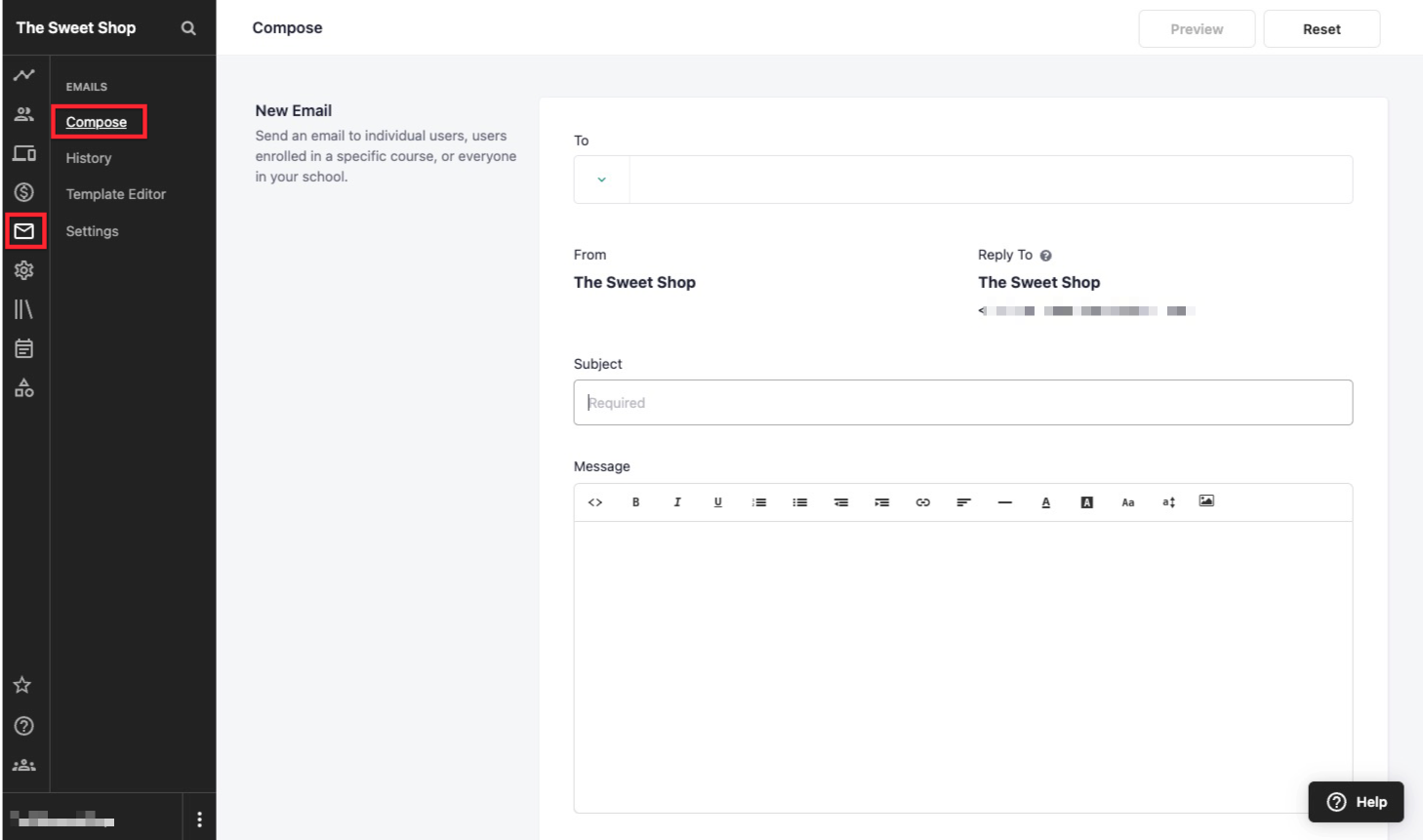
The verdict
Neither platform has the type of engagement features that a modern online course should have. But Kajabi is working hard to fix this and add new features, while Teachable hasn't really done anything.
Kajabi is the clear winner on engagement options. BUT running your course and community takes two separate apps which is a bummer. More on this below.
Branding & Customization
Kajabi
Here are some of the customization tools Kajabi offers:
Course and product templates that can be customized and designed to align with your brand, and save your own templates
Customize at the module and lesson levels to make them your own.
Build a website that matches your course with landing pages that fit your brand.
Customize emails that are sent to students.
Build in custom assessments for students
Add your own domain name
Kajabi has a decent set of branding and customization tools.
Teachable
Teachable has a lot of the same customization tools.
Customize your course content, appearance, and design (including building from templates).
Add in your branding elements to your Teachable course.
Build on a custom domain.
Customize landing and sales pages
Customize email templates
Remove Teachable branding (web app only)
The verdict
Both Teachable and Kajabi have similar branding customization tools. Neither one really stands out in this space. Notably, neither have the option to get your course on your own branded apps.
Monetization & marketing
The next category to consider with online course platforms is how their monetization options work. Here we're looking at the set of tools each one gives you to build an online business.
Monetization is not just about offering different ways for members to pay for things. It’s also about making sure the experience of paying for your content is simple and seamless.
Kajabi
In terms of monetization, Kajabi offers a robust assortment of options to creators who are looking to charge for their content.
Your online courses can be sold at a one-time, monthly, or annual fee, or given away for free. They also provide creators options for recurring payments in the form of subscription models.

Where Kajabi really shines, however, is their sales and marketing tools. They provide detailed sales analytics, easy to use templates to create landing pages, affiliate programs, email marketing, and more.
Here are some of the best business features Kajabi offers:
Landing pages that are connected to sales funnels. If you're using the funnel approach to market and sell courses.
Marketing automations like drip campaigns and sequences.
Email marketing tools
Different forms and pop-ups to capture leads
Add sales and discounts.
Teachable
Teachable has created their platform options for creators to use in their monetization strategy. You can create sales pages and landing pages to entice new members. There are also options to offer subscription models, memberships, one-time payments, and even course bundles.
And one of the best features is that you can customize course pages with a drag-and-drop editor.

Here are some of the other marketing and monetization tools Teachable has:
Email and affiliate marketing programs
Discounts, sales, and other course promotions (e.g. coupon codes)
Opt-in forms and lead generation tools
The verdict
Kajabi wins this one too. Teachable's drag-and-drop builder is cool and they have some good marketing tools. But Kajabi's are much more comprehensive, and the funnel building and opt-in tools are stronger. Both have email marketing built in, but Kajabi's is much better and seamlessly integrated to the funnels.
Some G2 reviews have complained that Kajabi can get a bit confusing on the back end when organizing plans and sorting members, but otherwise Kajabi is better than Teachable in the marketing and monetization features.
Native mobile app experience
Today, many of your potential members are living busy lives and aren’t always at their computers. Picking an online course platform that is available across web, tablet, and phone is an incredibly valuable feature.
Kajabi
Kajabi has a mobile app that is available on both iOS and Android, which is great because all of your members will have access to it. Their app has an emphasis notifying members of new things happening in your online course thanks to an assortment of push notifications.

The app also allows you to hop right into the action and interact with your online course members’ posts. On the member side of things, anyone currently enrolled in your course can access it through the app, watch your videos, complete assessments, and download materials for offline use.
But a warning. Kajabi community and Kajabi courses require two separate apps. Since the community functions of Kajabi came through acquisition, Kajabi hasn't merged the two. If you want a course and live events, you'll have to get your students to download two different apps.
Teachable
Teachable recently released their mobile app exclusively for iOS. While it’s great they finally got the ball rolling, their app isn’t designed to be used as a primary option for members to interact with online course material.
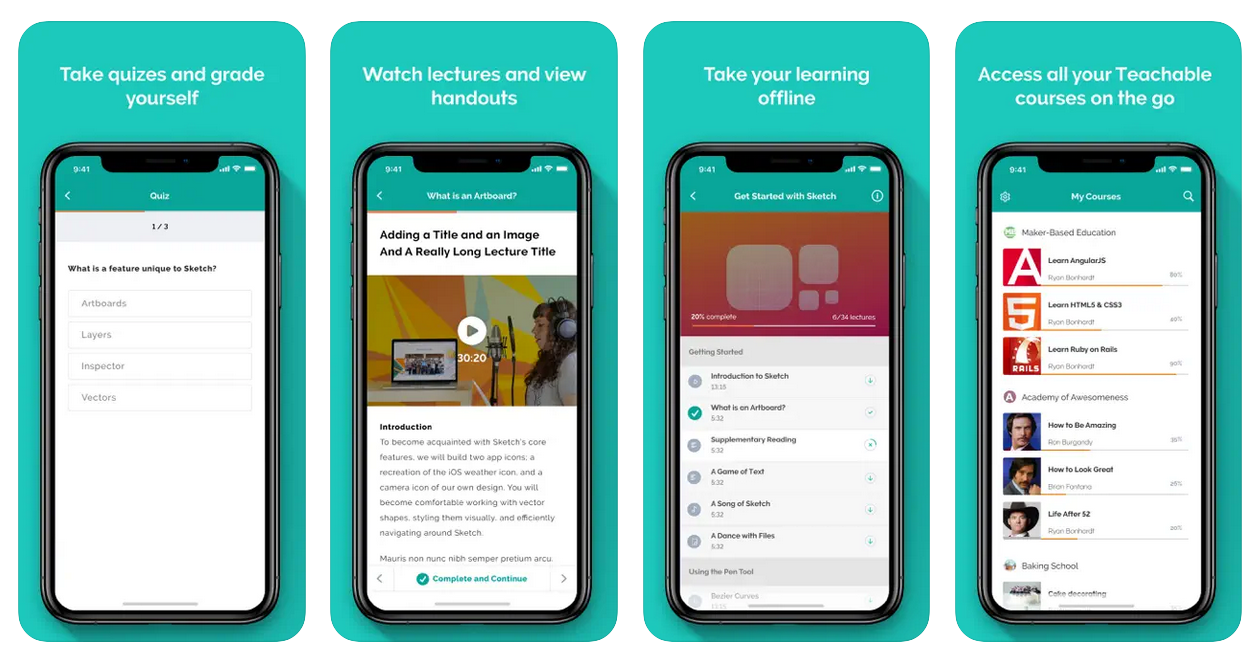
And honestly, having an app only for iOS is a bit ridiculous at this point.
The verdict
Both companies have serious issues with apps. Kajabi has awesome apps, but requires two different apps to run a course and community business together. Teachable has an app that only works for iOS -- 70% of smartphone users can't use it!
As a result, Kajabi is the better option here too. Having 2 apps is annoying, but at least your members have apps. Teachable doesn't cover you.
And neither platform has the option to add an app under your own brand.
Customer service
There's one more thing to consider, and we can do it quickly. When we surveyed user experiences of the platforms, most of the complaints about Teachable on ranking sites like G2 were about the customer service. Many users talked about tickets being ignored, problems that aren't fixed for them, and an overall sense that Teachable isn't willing to help.
Kajabi has an overall positive customer service track record.
Kajabi vs Teachable: Which is the winner?
So which is the winner when we compare Kajabi and Teachable? It's pretty clear that Kajabi wins on most counts. While it's not perfect, Kajabi is making strides to improve its community building tools. They have a marketing platform that's one of the best in the business. And--despite needing 2 apps--at least they have full app coverage (and the course app works well).
If you're comparing these two, Kajabi is a way better platform. However, that better platform does come at a steeper price. Kajabi starts from $159/mo and goes up from there.

Teachable does have a free plan you can start with (with a 1$+10% transaction fee). But even Teachable's $39/mo plan comes with a 5% transaction fee. If you made $1,000/mo, you'd paid Teachable $50 in transaction fees. So despite being cheaper, transaction fee plans can actually cost you more and punish you the more you make.
Kajabi is the better platform. Teachable might be a better deal, depending on how big you grow and which plan you choose.
But what if there was a better platform, that beautifully integrated courses and thriving communities, that performed better than both Kajabi and Teachable, all at a lower cost?
Want a better option?
Mighty Networks is a course and community platform that builds engagement everywhere, letting you bring courses, community, content, and commerce together in one place.
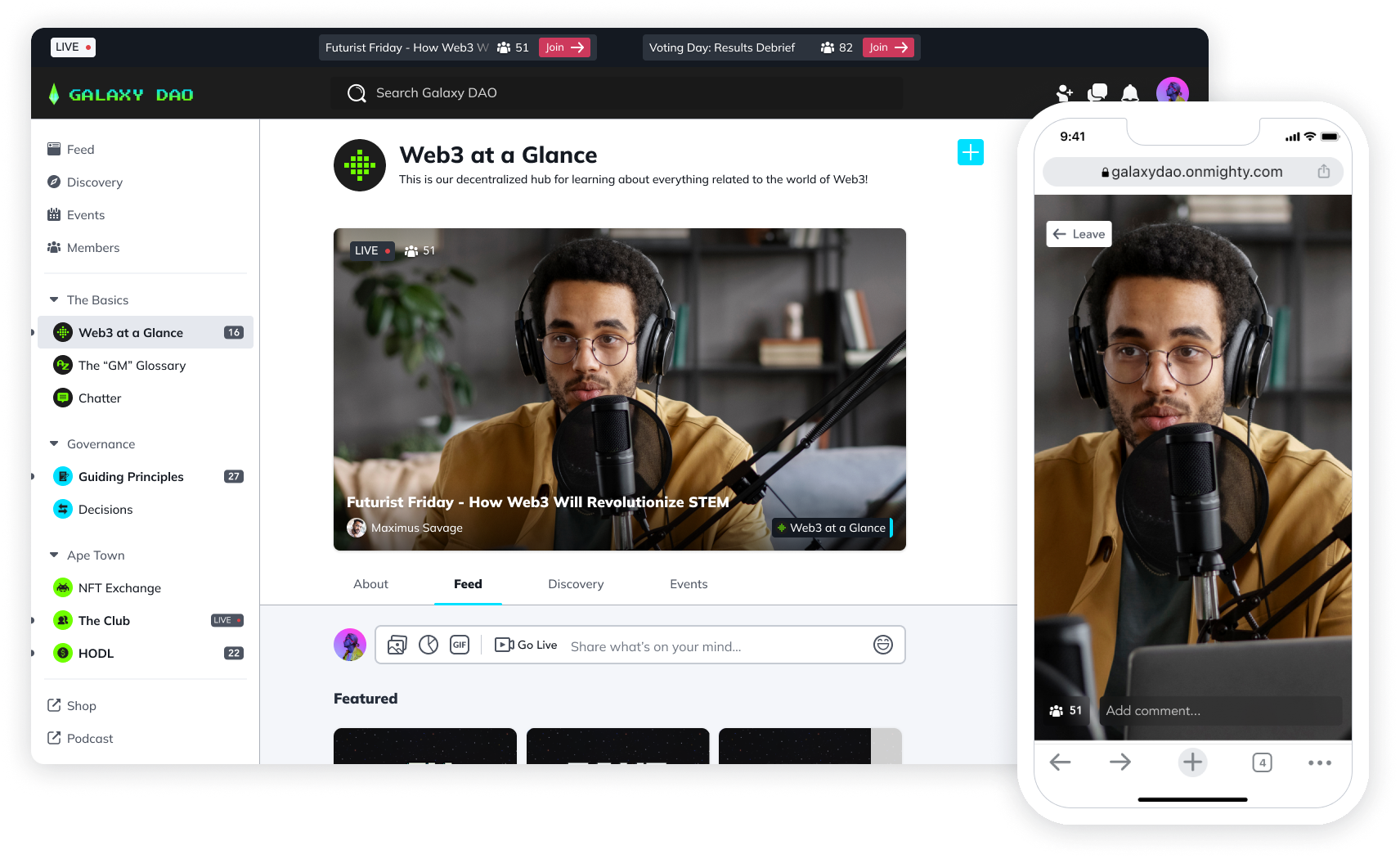
Here are some of the flexible course options Mighty gives you that neither Kajabi or Teachable does.
The ability to teach both pre-recorded or live cohort courses in one place.
One app with everything you need in one place--course and engagement--for EVERY device.
The option to fully integrate your course with community, live events, livestreaming, forums, and more.
You can add as many features to a course space as you want, creating engagement everywhere in a way that neither Kajabi or Thinkific do. This is what it looks like...
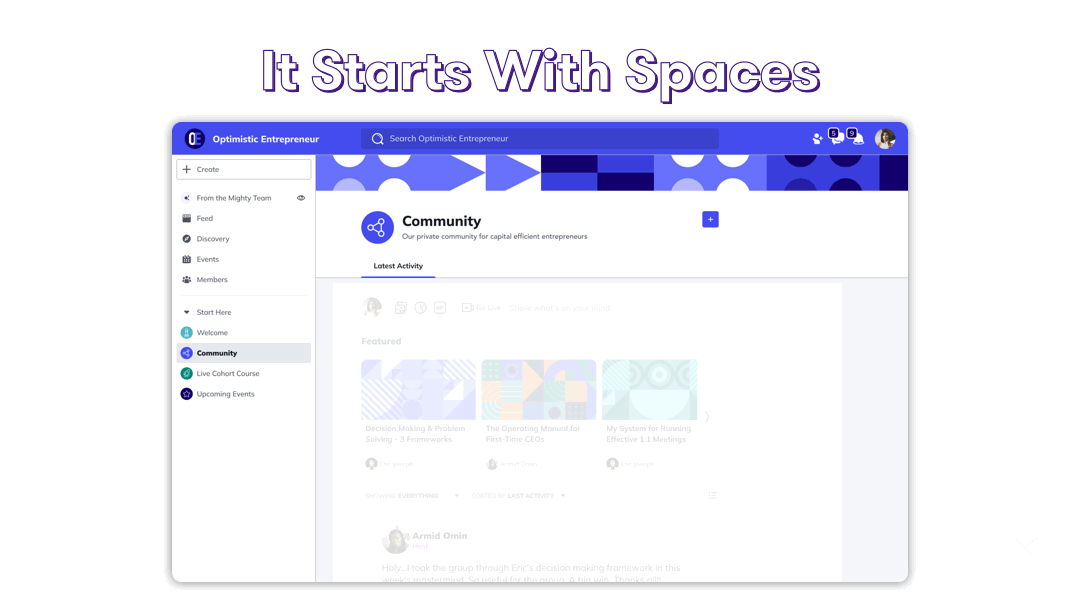
Here are just a few more of the features:
Offer paid memberships, premium groups, paid events, or bundles of ANYTHING you want to mix together.
Post EVERY kind of content NATIVELY: videos, images, and audio clips, all hosted on Mighty. And NATIVE livestreaming.
Create polls, discussion boards, quizzes, and Q&As.
Integrated AI features with Mighty Co-Host™ - instant course outlines, member profiles, one-click landing-pages, question generators, and more tools to BOOST human creativity without replacing it.
Mighty also integrates directly with ConvertKit for easy email marketing -- you can use this top-rated marketing tool to promote your community, build automations, sales, or even add a paid newsletter.
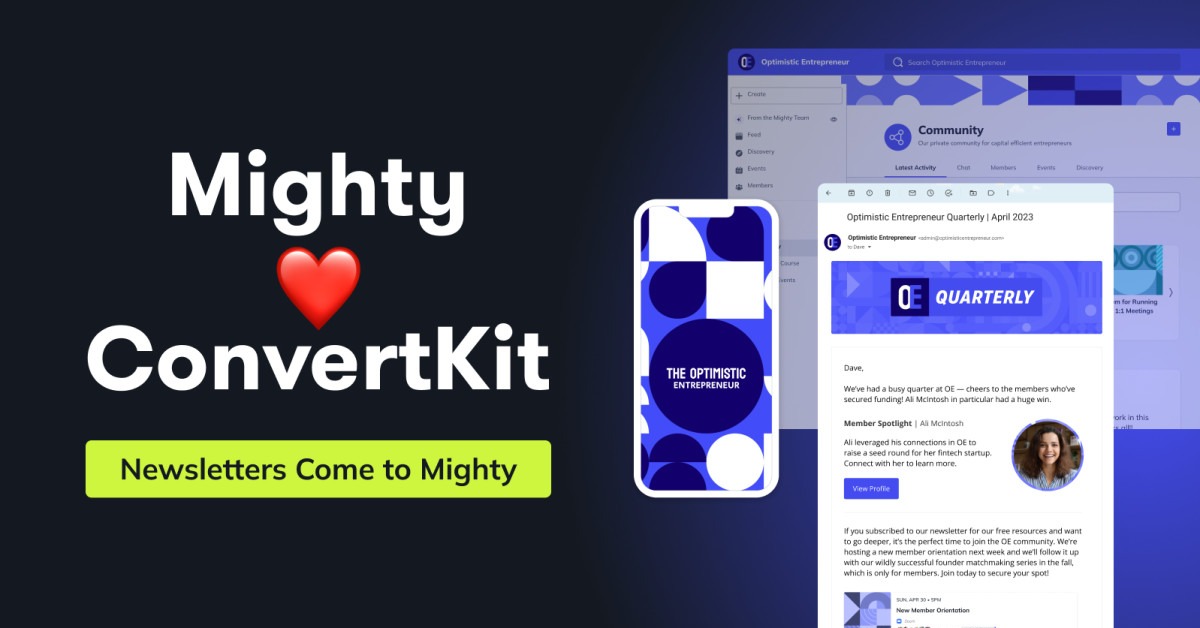
Try it free for 14 days! No credit card required.
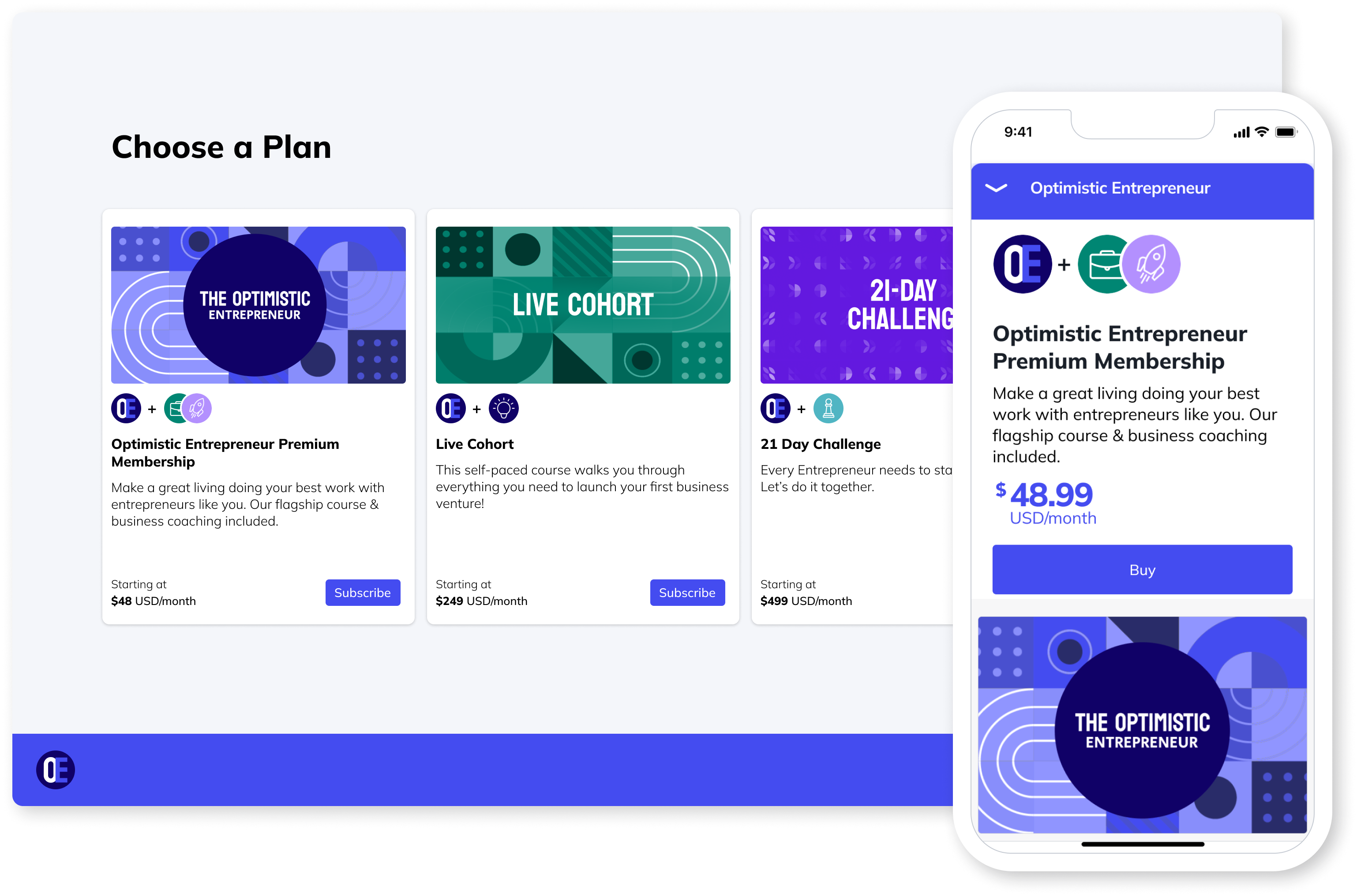
Branded course apps
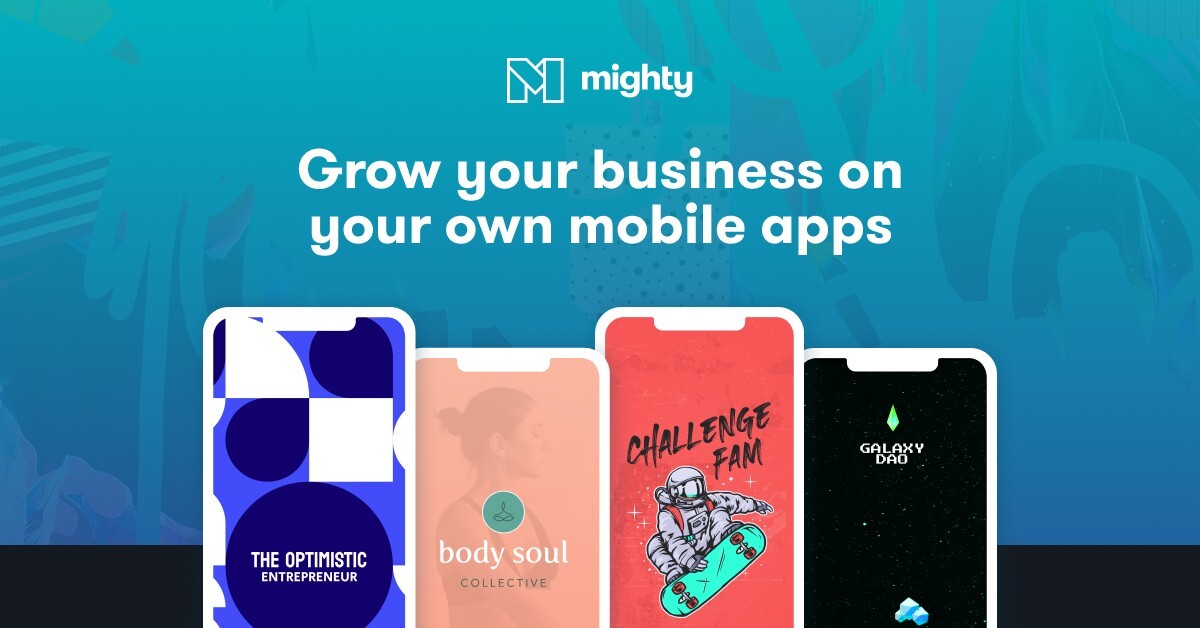
The final thing Mighty offers that neither Kajabi or Teachable do?
This means YOUR comprehensive course and community app, under YOUR brand in the App Store and Google Play Store.
Book a call with us to learn more!
Ready to start building your community?
Start a free 14-day trial to explore Mighty—no credit card required.
More like this
Join Mighty Community
Learn the principles of Community Design™ (and see them in action) alongside thousands of creators and entrepreneurs. It's free to join!

Online Courses
Creating a Course
Teaching a Course
Course Platforms
Selling a Course
Communities & Memberships
Community Platforms
Managing a Community
Building a Community
Growing a Community
Monetizing a Community
Creators & Entrepreneurs
Monetization
Content Creation
Starting a Business
Website Builders
Creating & Managing a Website
Events
Event Platforms
Hosting & Marketing Events
Branded Apps
Creating a Mobile App
Coaching Apps
Community Apps
Coaching
Mastermind Groups
Starting a Coaching Business
Coaching Platforms
Filter by Category
Online Courses
Communities & Memberships
Creators & Entrepreneurs
Events
Branded Apps
Coaching
Start your free trial
14 Days. No Credit Card Required.


















